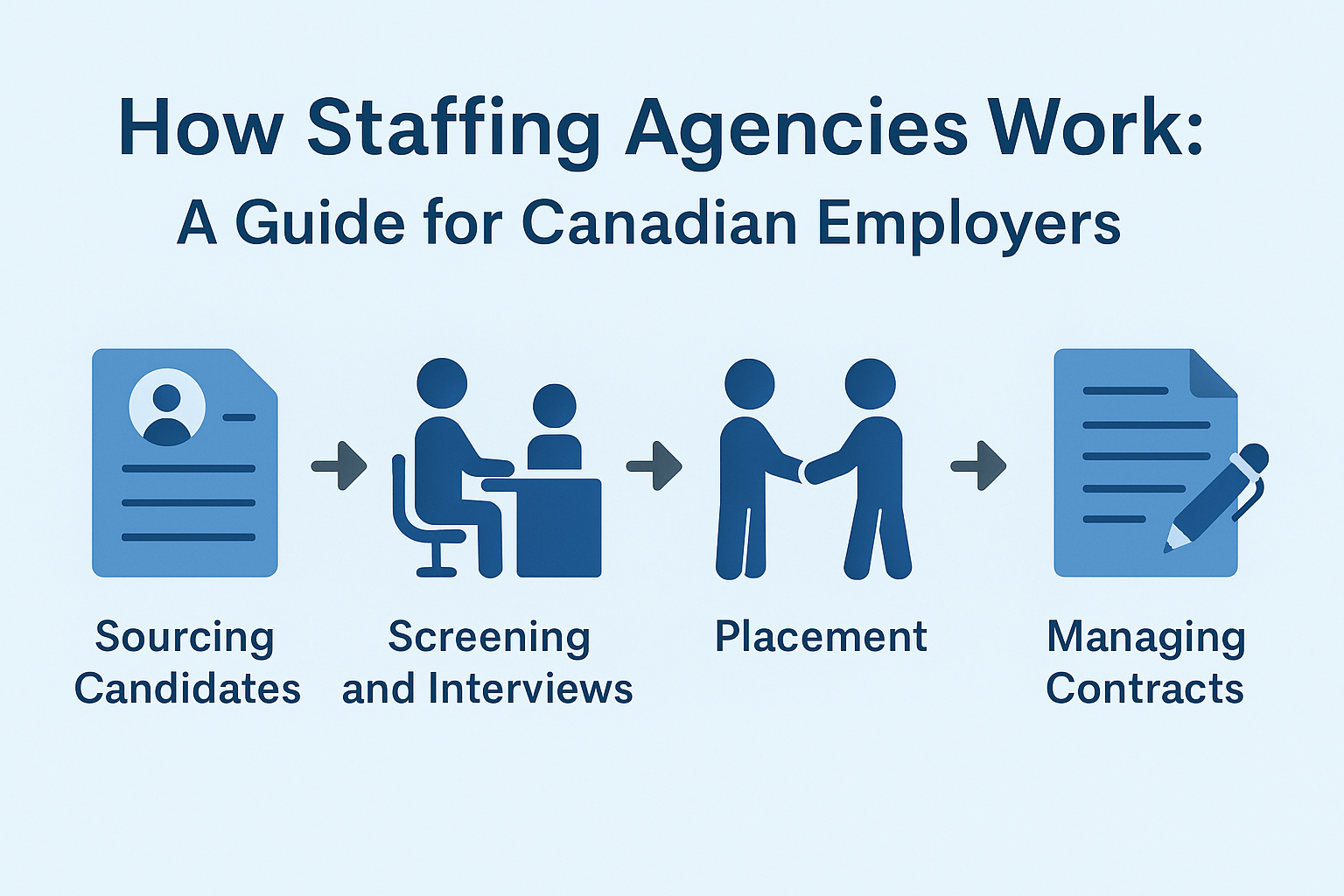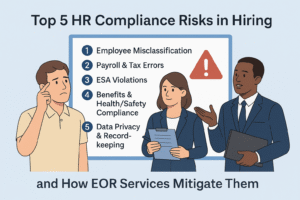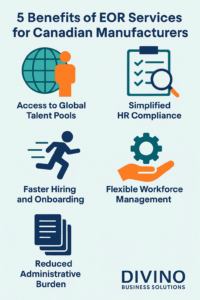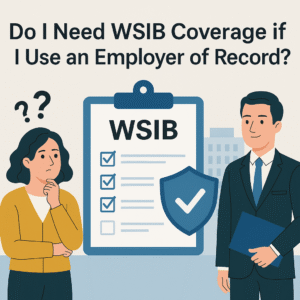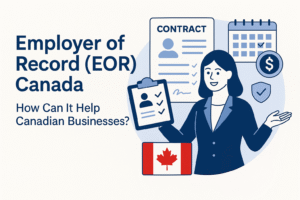Hiring in Canada today can feel like a never-ending challenge. Job postings sit unfilled for weeks, internal HR teams are stretched thin, and many small businesses don’t even have a dedicated recruiter on staff. That’s where staffing agencies come in.
For Canadian employers, staffing agencies provide a direct line to qualified candidates—handling the sourcing, screening, and even payroll management, depending on the arrangement. They save time, reduce risk, and give businesses access to a wider pool of talent than they might find on their own.
In this guide, we’ll break down how staffing firms actually work in Canada: from the moment you call them with a hiring need, to the final handshake when your new hire is onboarded. Along the way, we’ll look at costs, benefits, and best practices so you know what to expect and how to get the most out of your agency partnership.
What Is a Staffing Agency?
A staffing agency—sometimes called an employment agency or recruitment firm—is a third-party organization that matches job seekers with employers. They bridge the gap between companies looking for workers and candidates seeking employment.
The key point for Canadian employers to understand is this: the employer pays the agency, not the candidate. Job seekers never pay to be placed in roles. In fact, in provinces like Ontario, it’s illegal for an agency to charge workers a placement fee. That means agencies are 100% focused on delivering value to the employer client who hires them.
Staffing agencies aren’t limited to just one type of hire. They handle:
- Temporary workers (covering short-term gaps)
- Temp-to-hire arrangements (trial period before permanent hire)
- Direct hires (permanent roles)
- Contractors (specialized project-based work)
- Executive search (senior leadership and niche talent)
Step-by-Step: How the Staffing Process Works
1. The Initial Consultation
It starts when you, the employer, reach out to a staffing agency. You’ll typically meet with a recruiter or account manager to discuss:
- The job role(s) you need filled
- Required skills and qualifications
- Expected duration (short-term, long-term, permanent)
- Compensation and budget range
- Your company culture and team dynamics
This step sets the foundation. The more detail you provide, the better your agency can deliver candidates who aren’t just qualified on paper but also fit your workplace.
2. Sourcing Talent
Once the agency understands your needs, they get to work finding candidates. They’ll use multiple channels:
- Job boards (Indeed, Workopolis, LinkedIn)
- Their internal database of past applicants
- Referrals and professional networks
- Social media outreach
- Industry-specific talent pools
Because agencies recruit constantly, they often have a “bench” of pre-qualified candidates ready to start quickly. This is one of their biggest advantages over in-house hiring.
3. Screening and Shortlisting
Recruiters don’t just pass along every résumé they get. They filter applicants through:
- Resume reviews
- Phone or video pre-screens
- Skills testing (typing speed, software proficiency, trade assessments)
- Reference checks
- Background checks, if required
Only the top candidates make it to your desk. That means you’re not wasting hours sorting through unqualified applications. Instead, you’ll see a shortlist of candidates who are already vetted.
4. Employer Interviews
You select the candidates you’d like to meet. The agency arranges interview schedules, preps candidates, and manages communication. In many cases, they’ll collect feedback from both sides to keep the process smooth.
This coordination saves employers a surprising amount of administrative back-and-forth.
5. Job Offer and Placement
When you’ve chosen your candidate, the staffing agency steps in again:
- They extend the offer and negotiate terms
- They confirm the start date
- They finalize all documentation
For permanent placements, the worker joins your payroll directly. For temporary or contract roles, the worker technically remains an employee of the staffing agency, even though they report to you day-to-day.
6. Payroll and Administration
Here’s a critical distinction: in temporary arrangements, the staffing agency acts as the employer of record. They handle:
- Payroll processing
- Vacation pay
- CPP, EI, and income tax deductions
- WSIB/WorkSafe coverage
- T4 slips at year-end
You simply receive an invoice from the agency. This removes a huge compliance burden from your business, especially if you’re scaling up quickly.
7. Ongoing Support
Good staffing firms don’t disappear after placement. They’ll check in to ensure both you and the employee are satisfied. If issues arise, they can replace the worker or provide coaching. Many offer a guarantee period for permanent hires, meaning if the new hire leaves within a certain timeframe, they’ll conduct a replacement search at no extra cost.
Costs: What Do Staffing Agencies Charge?
Permanent Placement Fees
For direct hires, Canadian staffing agencies typically charge 15–25% of the candidate’s first-year salary. For executive or hard-to-fill roles, fees can go higher. Example: if you hire someone at $60,000/year, expect to pay $9,000–$15,000 in agency fees.
Temporary Staffing Markups
For temporary or contract placements, agencies add a markup on top of the employee’s hourly wage. Typical markups in Canada range from 25% to 50%.
- If a worker is paid $20/hour, you might be billed $25–30/hour.
- That extra covers payroll, taxes, benefits, insurance, and the agency’s margin but with Divino bussiness solutions this can be done in much cheaper way.
Retained Search
For senior leadership roles, some agencies work on a retainer model where part of the fee is paid upfront. This guarantees dedicated recruiter time for harder searches.
Why Canadian Employers Use Staffing Agencies
Save Time
Posting jobs, sorting résumés, and chasing references eats up hours. Staffing agencies streamline all of this, getting you quality candidates faster.
Access Hidden Talent
Many top candidates aren’t browsing job boards. Agencies maintain relationships with passive job seekers and can introduce you to talent you wouldn’t find on your own.
Reduce Risk
With screening, testing, and guarantee periods, agencies help lower the risk of a bad hire. For temporary roles, they carry the employer liability, not you.
Flexibility
Need extra staff for harvest season, holiday rush, or a short-term project? Agencies give you the ability to scale up (or down) without long-term commitments.
Market Expertise
Recruiters know the going pay rates, in-demand skills, and hiring trends in your industry. They can guide you on what’s realistic and competitive in Canada’s labour market.
Types of Staffing Services in Canada
- Temporary Staffing: Short-term coverage for illness, maternity leave, or busy seasons.
- Temp-to-Hire: A “try before you buy” arrangement where a candidate starts as a temp and may be hired permanently.
- Direct Hire: Permanent placements sourced and vetted by the agency.
- Contract Staffing: Specialized professionals hired for defined projects (common in IT, engineering, and healthcare).
- Executive Search: High-level recruitment for leadership roles, often nationwide or global in scope.
Best Practices for Working With a Staffing Agency
- Pick the Right Partner: Look for agencies that specialize in your industry or role type.
- Communicate Clearly: Be upfront about job duties, pay ranges, and workplace culture.
- Be Responsive: Fast feedback helps agencies secure top candidates before competitors do.
- Share Feedback: If candidates aren’t a fit, explain why so the agency can refine their search.
- Think Long-Term: Building a relationship with one or two reliable agencies can yield better results than constantly switching.
Real-World Example: Seasonal Work in Ontario
Imagine you run a packaging plant in Cambridge, Ontario. Every fall, production doubles to meet holiday demand. Instead of hiring dozens of temps directly (and juggling payroll headaches), you call a local staffing firm.
They supply 30 trained workers within a week. Those workers are on the agency’s payroll, covered for WSIB, and replaced quickly if someone quits. By December, demand drops. You call the agency and end the contracts—no messy layoffs, no compliance issues.
That’s the practical power of staffing agencies for Canadian businesses.
Conclusion
For Canadian employers, staffing agencies are more than a hiring shortcut—they’re strategic partners in workforce management. From sourcing and screening to payroll and compliance, they allow businesses to focus on growth while leaving recruitment complexities to the experts.
Yes, there’s a cost involved. But when weighed against the risks of bad hires, the time saved, and the flexibility gained, many employers find staffing agencies to be an investment that pays for itself.
If you’re a Canadian business looking to expand, cover seasonal peaks, or simply find better talent faster, partnering with a staffing agency could be the smartest move you make this year.
For employers in Ontario and across Canada, partnering with a local firm like Divino Business Solutions can make all the difference. As a staffing agency rooted in the Canadian market, Divino understands the unique needs of businesses—whether it’s navigating seasonal peaks, sourcing specialized talent, or managing compliance with provincial labour laws. With a strong local candidate network and a hands-on approach, Divino helps companies cut down hiring time, reduce HR overhead, and build reliable teams that keep operations running smoothly.
FAQs
Q1: Do staffing agencies in Canada charge employers or job seekers?
They charge employers. Job seekers should never pay for placement—this is prohibited under provincial laws like Ontario’s Employment Standards Act.
Q2: How quickly can a staffing agency fill a role?
Depending on the role, anywhere from a few days (for temporary labour) to a few weeks (for specialized or permanent hires).
Q3: What if a placement doesn’t work out?
Most agencies offer guarantees for permanent hires and will replace the candidate at no extra charge if they leave within a set period. For temps, agencies can swap in replacements almost immediately.
Q4: Are staffing agencies regulated in Canada?
Yes. They must comply with employment standards, health and safety laws, and cannot charge job seekers fees. Many are also members of ACSESS, the Canadian industry association.
Q5: Can agencies help with contractors or consultants?
Yes. Many agencies provide project-based or specialized contract staffing, handling either the payrolling or the matchmaking process.
Check out how to simplify recruitment or The Bias of Interviews: Are You Just Hiring a Smile?
References (not part of word count)
- Altis Recruitment – “What Is a Staffing Firm and How Does it Work?”
- Indeed Career Guide – “How Do Staffing Agencies Work?”
- Bilingual Source – “Are Recruitment Agencies in Canada Worth It? Understanding Value and Costs.”
- Ringover – “10 Step Guide to How Staffing Agencies Work”
- Employment Professionals Canada – “Ultimate Guide to Working with a Staffing Agency”
